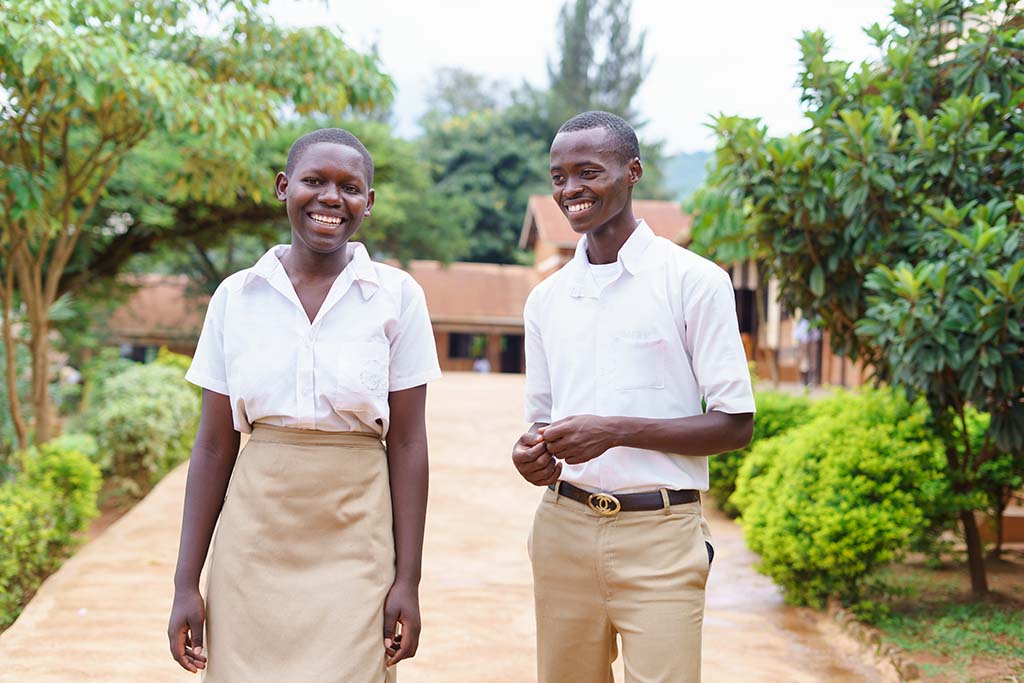The power of young voices in Rwanda
Thanks to Paper Crown Rwanda, the students at G.S Gihogwe meet every Wednesday to learn about their sexual and reproductive rights and gender-based violence—an initiative meant to create lasting social change in Rwanda.

For a long time, Rwanda has struggled with a growing rate of unwanted teen pregnancies and alarming numbers of teenage mothers—one of the reasons being lack of knowledge about sexual and reproductive health and rights amongst young adults. The Kvinna till Kvinna Foundation’s partner organisation, Paper Crown Rwanda, works hard to change that.
Through a unique school club programme called ‘My Voice, My Power’ students at G.S Gihogwe, located on the outskirts of Kigali, learn about sexual and reproductive health. In addition to ‘the basics,’ Paper Crown focuses on everything from challenging gender norms, fostering leadership, gender-based violence and self-defence skills. The club meets every Wednesday after lunch and includes adolescent girls and boys.
Knowing about sexual and reproductive rights is lifesaving
17-year-old Justine lives around an hour from the school in Gisozi and is one of the students participating in the club. When Paper Crown came to tell her about the programme, she was curious to learn more about the different topics and how and how sexual and reproductive health and violence are linked.
She tells us that they were taught about the three rules of abuse and that it changed the way she views abuse.
“Before I used to think that it was my fault, that the victim was to blame. Now I know that it’s never the victim’s fault if you are abused,” says Justine. “Now, if someone wants to join the club I will teach them about the three laws of abuse—sexual abuse is always wrong, it’s never the fault of the person that has been abused and sexual abuse should never be kept quiet.”
Pioneers in teaching self-defence and SRHR
Paper Crown believes teaching both girls and boys about sexual and reproductive rights and gender-based violence to transform gender norms and prevent future violence. But changing norms takes time and the organisation also believes in girls’ right to learn helpful skills and tactics that can help them in potentially dangerous situations.
The self-defence skills are designed to teach the girls to exit situations in safe ways without having to engage physically. For Justine, the new skills have already come into use.
“One day, I was in my neighbourhood and I used the moves. I was going to the shop and someone grabbed a hold of my arm. It was an older man and he was much stronger than me, but I was very loud and he let go of me. In the moment I was scared at first, but then, when I used the movement, I wasn’t scared anymore. It was like what I had trained for,” says Justine.
She hopes more girls will get the chance to join the club, both to learn how to be able to protect themselves from abusive men, and about their sexual and reproductive health and rights.
“Most of the girls in my community don’t have knowledge of SRHR. Men can tell them the wrong things, like that you won’t get pregnant if you have sex standing up,” says Justine.
Changing his view on women’s rights
20-year-old Clement is another student at the school who wanted to learn more about the importance of gender-equality and sexual and reproductive health and rights.
“I was specifically interested in gender-balance. The first day, I learned that boys and girls are allowed the same. We have to work together, there shouldn’t be a role for women and a role for men, we have to share the work,” he says.
Clement was elected to be one of the leaders, teaching newcomers about what they’ve learned so far. He wants to teach the other students that the knowledge they’re taught can be a benefit—for both boys and girls.
“We know some things culturally, but here we can gain more knowledge. I used to think I had more rights than my sister and because of that, I felt superior to her. The club has changed that mindset,” says Clement.